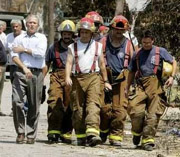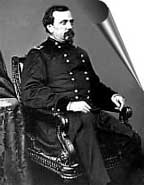Fitzgerald’s news conference has been postponed to 2:15. I will live blog.
It’s beginning. Fitzpatrick speaks:
A federal grand jury returned a 5 count indictment against Libby.
National security was at stake, so we had to find out accurate facts.
It is important that the witnesses who come before a grand jury tell the complete truth.
Fall of 2003–when it was clear that VW’s cover had been blown, the investigation began. Libby was interviewed. Mr. Libby gave the FBI a compelling story that he got this information from Tim Russert.
Valerie Wilson was a CIA officer, and in July 2003 this was classified. Her friends, colleagues had no idea. It is important that a CIA officer’s identity be protected. Her cover was blown in July 2003. Mr. Novak was not the first reporter to be told about this. Libby told Miller; this was the first leak of her identity. Libby said when he passed this information on to reporters he had made it clear he didn’t know the story was true. Libby said the same thing to the grand jury, under oath. Just passing gossip. Long end of a change of phone calls.
This story was not true.
At least four people within the government had told Libby about VW before the Russert conversation. A full month before Novak’s column he discussed NW with a CIA somebody.
Fitzgerald continues to recount all of the circumstances in which Libby discussed VW with other people. Libby was the first government official to discuss this information with reporters.
Questions:
Q Began as a leak investigation but no one is charged with leaking.
A Investigation is not over. Substantial part of the work is concluded. Another grand jury will be kept open to consider other matters. Baseball analogy: If a pitcher hit a batter in the head with a ball, you’d like to know why he did that. Lots of reasons. What you want to do is have as much information as you could to find out what the batter might be thinking. Then you make a decision whether the pitch was deliberate or an accident.
What was done to Valerie Wilson was done to all of us. What we have are charges of obstruction of justice. I can’t tell you what Libby’s motives were. The obstruction charge is not less than a leak charge. This is a very serious matter.
Q Do you have evidence against Dick Cheney encouraged Libby.
A I don’t talk about people not charged in the indictment. We make no allegations about criminal acts. I will not comment on anyone but Libby. This is a standard practice. Don’t read anything into that.
Q What about the “senior official” mentioned in indictment.
A We can’t tell you everything we know. This is the law. We gather information, the explicit requirement is that if we don’t talk about people not under indictment.
Q Is Karl Rove off the hook, other individuals might be charged?
A Cannot comment.
Q What are you still working on?
A Cannot comment.
No one wants this over with more than I do. We hope to finish as soon as possible.
Q Damage done to all of us, to the nation. Can you be more specific?
A No, but let me say this. People who work at CIA have to expect that information and identities will be protected.
Q What about “leaks” from witnesses?
A Grand jury secrecy does not bind witnesses. Jurors or prosecutors cannot speak about grand jury, but witnesses are not restircted.
Q Were you troubled that people in government were talking about VW weeks before she was outed.
A Not my concern.
Q — I didn’t hear this question clearly.
Q What about Judy Miller?
A No one wanted to have a dispute with the NY Times. I didn’t have a vested interest in litigating it, a first amendment showdown. Our job was to find information. We thought long and hard before we issued subpoenaes. We only subpoenaed if we really needed that testimony. What we did in seeking that testimony was born out by judges rulings. (Miller’s testimony needed for perjury charges, apparently.)
Q You said Mr. Libby the first person to leak outside the government. Other people leaked? What can you tell us of other leakers?
A I can’t go beyond what’s in the indictment.
Q Did Mr. Libby know VW was covert?
A Let me say that I am not speaking to whether VW was covert. Her association with the CIA was classified. We do not know if Libby knowingly outed a covert agent.
Q Missed question; about secrecy and grand jury rules.
A Grand jury testimony rarely shared with congress.
Q Your critics charge you with being a partisan.
A One day I read I was a Repubican hack and the next day I was a Democratic hack. I am not registered with either party.
Q Final report?
A No final report. Used to be issued by independent counsels, included information about people not charged with crimes. I don’t have the authority to write a report. We should charge someone or be quiet.
Q Other prosecutors issued reports.
A I am not an independent counsel. I have to follow the code of federal regulations.
Q You are being criticized for not bringing charges in the underlying crime, outing a CIA agent.
A That doesn’t fly. Any notion that anyone might have that we are singling out a high official is just not true. We indict on obstruction all the time.
Q How did Wilson get sent to Niger; what was VW’s part in this.
A The only thing that’s relevant is the idea in the minds of some people that she was involved; this is not relevant to this investigation. The belief that she was involved is an issue, however.
Q Do you think Libby tried to discourage Miller’s testimony?
A I don’t comment on anything not in the indictment.
Q Why isn’t it a crime to give classified information to someone not authorized?
A He had to know it was classified. If Mr. Libby is proved to have done what we allege, this will vindicate the public’s interest. The point here is that we will make fine distinctions; we need to know the truth about what they said and what they know.
The act of obstruction keeps us from knowing the whole truth.
Q Will you participate in trial.
A Yes, part of team.
Q If information comes out in trial, what would you do?
A Any new information will be handled by our investigation team.
Q You won’t have a grand jury?
A We can use anothr grand jury.
Q You are dealing with memories from long ago. How can you prosecute that.
A That’s the point of the trial.
Q At the last minute there was FBI activity. Wlson’s neighbor’s interviewed. Why?
A With all respect, someone interviewed the guy who shined my shoes the other day. We wanted to get as much done before October 28 as we could. Don’t read anything into that.
Q Is this indictment a vindication of antiwar sentiment?
A This indictment is not about the war. People should not look to this indictment for vindication or resolution of how they feel. The indictment will not seek to know whether the war was justified or unjustified.
Q (questions garbled)
A All I’ll say; there is no statute that says it is a crime to pass on secret information. You have to know motive, state of knowledge, intent, facts; if the allegations in the indictment are true, then there is no way to know if Mr. Libby violated other laws. We didn’t get the straight story.
Now we’re getting down to the dumb questions. I think the major points discussed are these:
The investigation is ongoing. A new grand jury is available to Fitzgerald if he needs one. He will not comment on Karl Rove or anyone not named in the indictment.
The obstruction and perjury charges should not be interpreted to mean that Libby did not violate other laws. The charges mean Fitzgerald was unable to find out if other laws were violated or not, because of the obstruction.
He will not say if there will be other charges.

 As president, Bush struck a political bonanza in September 11. But his biggest
As president, Bush struck a political bonanza in September 11. But his biggest  You may have heard that Scooter is the first White House official to have been indicted since the Grant Administration. Just for fun, let’s take a look at that last indictee, Orville Babcock.
You may have heard that Scooter is the first White House official to have been indicted since the Grant Administration. Just for fun, let’s take a look at that last indictee, Orville Babcock.